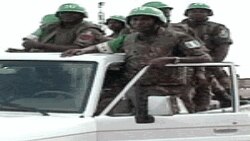The International Criminal Court (ICC) will open investigations at the Hague Monday of a case that could pave the way for its first trial involving war crimes committed in Darfur, Sudan. The case, involving Justice and Equality Movement (JEM) rebel leader Bahar Idriss Abu Garda, surrounds a September, 2007 attack on a base in Haskanita, North Darfur that killed 12 African Union peacekeepers. It comes seven months after the court indicted Sudan’s President Omar Hassan al-Bashir for Darfur war crimes and crimes against humanity.
Attorney Elise Keppler, is senior counselor of Human Rights Watch’s International Justice Program. She says that Sudanese authorities are not cooperating with today’s probe, even if it targets one of Khartoum’s principal adversaries in the Darfur conflict.
“This is something that Khartoum has obstructed even more so. That opposition has only intensified since the arrest warrant was issued for President al-Bashir,” she noted.
While noting that the case against Abu Garda is also the first at the ICC involving crimes against international peacekeepers, Keppler says that the court’s warrant against Sudan’s president and his resisting of arrest remain the driving force behind the Bashir government’s obstruction of the court’s investigation.
“I think the real issue is that Khartoum is opposing the work of the International Criminal Court in a more fundamental way. And so while this case might not oppose their interests, the larger investigation and prosecution may, and there has been obstruction overall with the International Criminal Court’s efforts,” she noted.
Sudan is not a signatory to the Rome Statute, which subjects it to the court’s legal obligations. But Keppler points out that the case against Abu Garda was raised by the United Nations in order to protect African civilians and the African peacekeepers that are protecting them.
“The situation in Darfur was referred by the U.N. Security Council, and the fact that Sudan is not a party to the International Criminal Court…normally Sudan would not be allowed to come before the court, but because there was a Security Council referral, the situation came before the court that way. And the overall work of the International Criminal Court to prosecute crimes in Darfur is essential to bringing justice for the victims, to promoting civilian protection,” she emphasized.
Although Abu Garda is not in ICC custody, he voluntarily appeared before the court back in May in response to a pre-trial summons and is expected to return to the Hague for Monday’s hearing. Human Rights Watch’s Keppler says neither the court nor the ICC prosecutor is overzealously pursuing African suspects at the expense of violators from other continents.
“The moving forward of charges against Abu Garba is taking place within a context where there’s been criticism coming from some African officials that the ICC is unfairly targeting Africans. And this case is an instance that really reflects the ICC’s dedication to protect African civilians, to promote protection for African civilians, and to protect those who are sent by African governments to protect African civilians,” she said.
At this point, it is clear that Monday’s probe could set up the International Criminal Court’s first war crimes trial of wrongdoing in Sudan’s Darfur. But Elise Keppler says it is not yet clear whether the Abu Garba case could ultimately extend the reach of the court to a trial against Sudan’s president.




